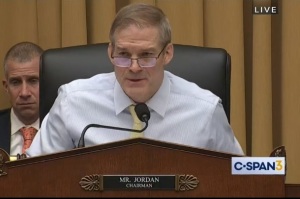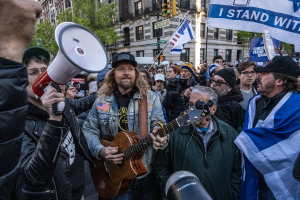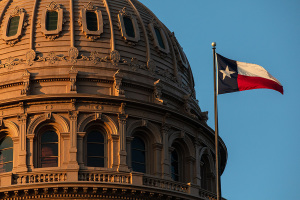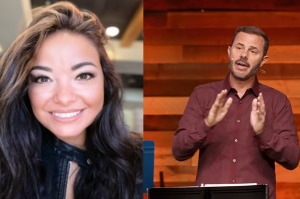Christians more likely than 'nones' to say border surge is a 'crisis': Pew study
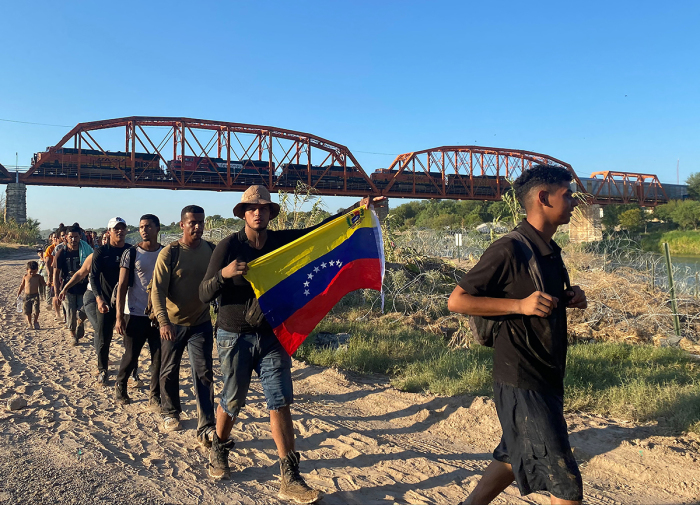
Christians are more likely than their non-religious peers to view the record influx of illegal immigrants coming through the United States' southern border as a "crisis," a new study suggests.
The data released by the Pew Research Center on Monday is based on responses collected from 5,140 adults from all 50 U.S. states conducted between Jan. 16 and 21. All respondents are members of Pew's online American Trends Panel and were recruited through a national, random sampling of residential addresses.
The study examines Americans' thoughts on the current state of U.S. immigration policy as the issue continues to be a major focus point ahead of the 2024 presidential election.
When asked for their views on "the large number of migrants attempting to enter the U.S. at the border," a plurality of respondents (45%) identified the situation as a "crisis," while an additional 32% characterized the border surge as a "major problem." About 17% dismissed the rush at the border as "a minor problem" while the remaining 4% thought that it was "not a problem."
The religious subgroup most likely to view the situation at the border as a "crisis" was white Evangelicals (70%), followed by white Catholics (64%), white nonevangelical Protestants (57%), Protestants (57%) and Catholics (53%). Less than one-third (32%) of black Protestants believe that the border surge constitutes a "crisis," while an even smaller percentage of religiously unaffiliated Americans (27%) said the same.
The survey didn't include enough responses from Hispanic Catholics and subgroups of religiously unaffiliated Americans to permit a separate analysis of their beliefs on whether the border situation is a crisis. Additionally, the survey didn't include large enough samples of other religious groups, like Jews and Muslims, to analyze their responses to any of the questions in the survey.
While a majority of Americans (57%) agreed that the "large number of migrants seeking to enter at the border with Mexico is leading to more crime in the U.S.," opinions on the impact of the border surge differed based on religious affiliation.
Solid majorities of white Evangelical Protestants (82%), white Catholics (70%), white nonevangelical Protestants (69%), Protestants (68%) and Catholics (60%) believe that the large number of illegal immigrants flooding into the U.S. was leading to more crime.
By contrast, less than half of respondents who identified as "nothing in particular" (47%) expressed concern that the border surge was causing an uptick in crime. Similar shares of Hispanic Catholics (47%), black Protestants (43%) and the religiously unaffiliated (41%) said the same. The groups least likely to see a connection between the border surge and crime were agnostics (36%) and atheists (24%).
"The differences between religious groups on many of these questions are in line with broader divisions between Republicans and Democrats," the report authored by Pew Senior Writer Dalia Fahmy reads. "White Christians — especially White evangelical Protestants, but also White Catholics and White nonevangelical Protestants — mostly vote for Republican candidates. And far more Republicans than Democrats view the situation as a crisis and say the migrant surge leads to increased crime."
"By contrast, Black Protestants, Hispanic Catholics and religious 'nones' mostly vote Democratic," Fahmy adds. "And Democrats are far less likely than Republicans to view the situation as a crisis or say the migrant surge is driving up crime."
Religious subgroups also differed in their views as to why migrants were coming to the U.S. in the first place.
Majorities of Americans agreed that "good economic opportunities in the U.S." (71%), "violence in their home countries" (65%), and "belief that U.S. immigration policies will make it easy to stay in [the] country once they arrive" (58%) were the main factors attracting illegal immigrants to the U.S.
Majorities of all religious subgroups contend that "good economic opportunities in the U.S." were causing the surge at the border, with this belief most pronounced among agnostics (80%) and least prevalent among white Evangelicals (65%). At least half of all religious subgroups maintained that migrants were coming to the U.S. to escape "violence in their home countries." Agreement with this conclusion ranged from 50% among white Evangelicals to 86% among atheists.
Although a majority of respondents pointed to U.S. immigration policies as a "major reason" for the border surge, views on the role of immigration law differed sharply based on religious identification.
Strong majorities of white Evangelicals (74%), white Catholics (69%), white nonevangelical Protestants (66%), Protestants (65%), Catholics (65%), and Hispanic Catholics (62%) thought that immigration policies that made it easier for immigrants to stay in the country indefinitely spurred more migrants to travel to the U.S.
A slight majority of black Protestants (52%) also stated that U.S. immigration policies influenced migrants' decision to come to the U.S. Less than half of adherents to all non-religious subgroups said the same. Less than half (48%) of respondents who classified themselves as "nothing in particular" attributed the border surge to U.S. immigration policy, followed by 44% of the religiously unaffiliated, 41% of agnostics and 31% of atheists.
Data from U.S. Customs and Border Patrol shows record numbers of encounters between migrants seeking entry into the U.S. and border enforcement officials at the U.S.-Mexico border. The number of monthly crossings reached a record high of 301,983 in December 2023.
While the number of encounters dropped to 176,205 in January 2024, more than 7 million migrants have entered the U.S. since February 2021, President Joe Biden's first full month in office. The surge in border crossings has reflected negatively on Biden's approval rating on the issue of immigration.
The RealClearPolitics average of polls asking voters for their thoughts on Biden's handling of immigration since Feb. 8 shows the president's approval rating 35.4 points underwater. By contrast, Biden's overall approval rating is 16.8 points underwater. Immigration is expected to be a major issue in the 2024 presidential election. Biden will likely face off against former President Donald Trump, who sought to erect border fencing along the U.S. southern border in his first term.
Ryan Foley is a reporter for The Christian Post. He can be reached at: ryan.foley@christianpost.com
















